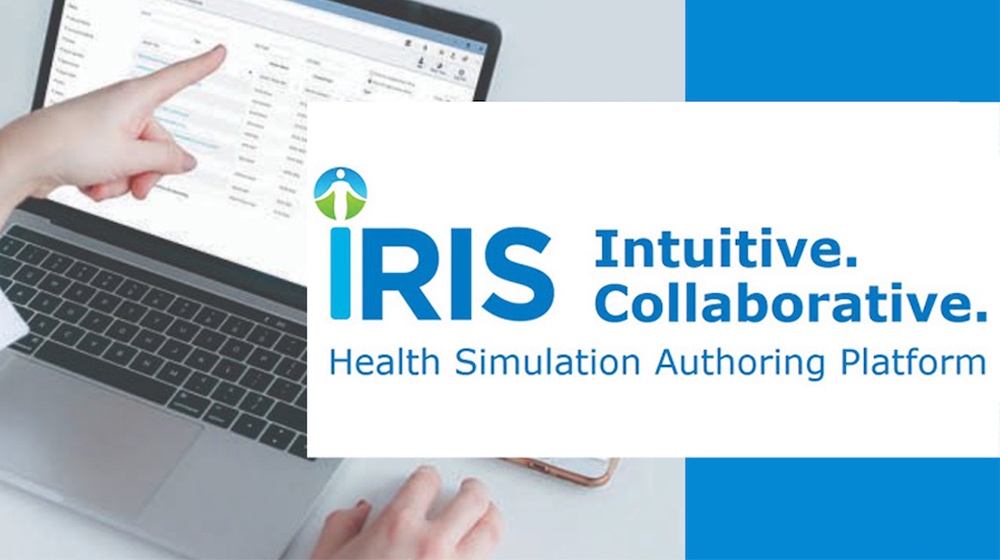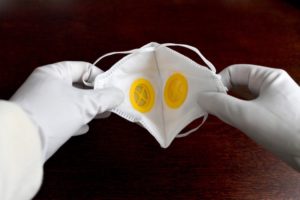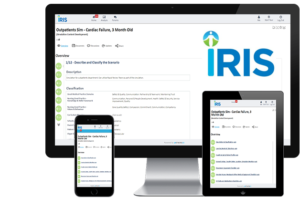iRIS
iRIS Health Solutions is a United Kingdom-based software company that provides an innovative and engaging web-based healthcare simulation scenario authoring platform to organizations worldwide. The technology helps clinical simulation educators to easily design, develop and manage high-quality training simulation scenarios in collaboration with peers and subject matter experts by using a step-by-step wizard. Best of all, the solution allows users to export scenarios straight to manikins and other technologies from most leading simulation vendors. This includes Laerdal, CAE, UbiSim and now iSimulate.
Used by over 2,000 healthcare simulation authors around the world, iRIS is hosted online, and requires only a browser for access, so it has a minimal IT footprint and is easy to deploy for simulation teams and faculty. When working in iRIS’s step-by-step wizard, educators seamlessly incorporate best practice frameworks (INACSL, ASPE, PEARLS Healthcare Debriefing Tool, etc.) across the full spectrum of simulation programs — full-body Manikins and Patient Simulators, Standardized Patients and Task Trainers. It is an ideal solution for educational institutions, simulation centers, simulation networks and simulation membership organizations.
One particularly amazing benefit of the iRIS solution is how easy it is for educators to create and share consistently high-quality content using the standardized wizard and approaches. iRIS helps educators to harness expertise as they develop new content and significantly reduces time collating and redeveloping simulation resources. iRIS provides step-by-step guidance, so it is also perfect for new simulation authors, as it helps them create scenarios in a straightforward and comprehensive way that aligns with INACSL and other standards of best practice.
Sponsored Content:
iRIS further provides step-by-step guidance, so the platform is also perfect for new simulation authors, as the solution helps them create scenarios in a straightforward and comprehensive way that aligns with INACSL and other standards of best practice. Other benefits of the iRIS case authoring tool include:
- Maximize the impact of simulations through standardized, high-quality authoring.
- Achieve significant time efficiencies for authoring content and collating simulation resources.
- Reduce the time and effort required to train colleagues in the authoring of content.
- Increase the impact of high-quality content through sharing across the community.
“Thanks to iRIS, we have been able to achieve equity of access to high-quality educational material whilst creating a system that allows educational governance, collaborative development of high-quality educational material and sharing of resources. iRIS addresses the ‘reinventing the wheel’ phenomenon that often exists in the simulation and education community,” said Dr. David Grant, past president of SESAM, associate dean of HEESW (2012-2017), consultant in PICU at Bristol Children’s Hospital and simulation and interprofessional learning lead for the University of Bristol’s School of Medicine.
“Everything you need to create a scenario is just one click away. Easy reference to best practice frameworks helps develop high-quality scenarios for inter-professional training. And it’s very convenient to tag and store scenarios and reuse as needed. It really makes scenario development effortless and faster,” said Kim Leighton, Executive Director, ITQAN Clinical Simulation and Innovation Center, Hamad Medical Corporation, Past President, INACS.
The iRIS Health Simulation Authoring Platform is developed by a dedicated team in both the UK and Bangalore, India. This agile and exceptionally skilled group has designed, developed and evolved the iRIS Health Simulation Authoring Platform since its inception.
Sponsored Content:
Case Study: Real-World iRIS Application
In 2018, iRIS began helping to transform simulation at the Cape Peninsula University of Technology (CPUT) in South Africa. At the time, the university sought to develop interprofessional education (IPE) scenarios, fostering frequent collaboration across emergency medicine science and other healthcare professionals. But the university’s only standard format for scenarios was a Microsoft Word template. Scenarios and their resources would typically be emailed between authors for development or even exchanged via USB memory sticks.
As a result, John Meyer, lecturer within the university’s emergency medical sciences, knew things had to change. The immersive clinical simulation center needed a solution to improve the quality of scenarios, make authoring and sharing more efficient and reduce the pressures on the clinical simulation team. To meet this need, the university adopted iRIS to improve the quality of scenarios and make authoring and sharing easier and more efficient.
“The time we have gained back from no longer having to search emails for up to date versions of scenarios and their resources or spend so much time face to face supporting clinicians has enabled the simulation team to expand our scope,” shared John Meyer, Lecturer in Emergency Medical Sciences, Cape Peninsula University of Technology, South Africa.
Since implementing iRIS, Meyer believes all the university’s simulation scenarios are now in a standardized format and housed in iRIS. Meyer says if the simulation isn’t in iRIS, then it isn’t approved for use with learners. The university now uploads all of the resources required to run a scenario directly into iRIS, including the Laerdal programming files generated by iRIS for its manikins.
“It has made our operation so much more efficient, as we know exactly where all the resources for a scenario are. The quality of our scenarios is improved by the process that iRIS has given us in authoring content,” Meyer said. “Our simulation technologists have easy access to scenarios well in advance of running them so that they know exactly how our labs need to be configured.”
He added that CPUT has regained time from no longer having to search emails for up-to-date versions of scenarios and their resources or spend so much time supporting clinicians face to face. This saved time has enabled the university’s simulation team to expand its scope. They now develop clinical scenarios for new and exciting situations that learners previously would not have been able to experience. Meyer shared that as the global iRIS community grows, his team is enjoying the opportunity to collaborate and share clinical simulation scenarios with other institutions. Learn more on the iRIS website or read these articles below.
iRIS Simulation Education Latest News
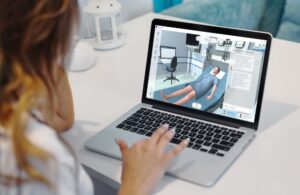
CAE Healthcare Suite of Digital Products Enhances Virtual Learning Experiences
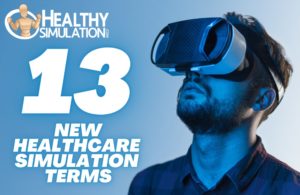
13 Medical Simulation Keywords You Need to Know About

8 Medical Simulation Keywords You Need to Know About

Sim Scenario Authoring Tool iRIS Increases University’s Remote Collaboration

Collaborative Sim Scenario Design Made Easy with Cloud-Based iRIS Platform
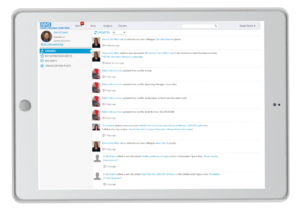
iRIS: Collaborative Simulation Authoring Platform in the Palm of Your Hand!
Sponsored Content:



